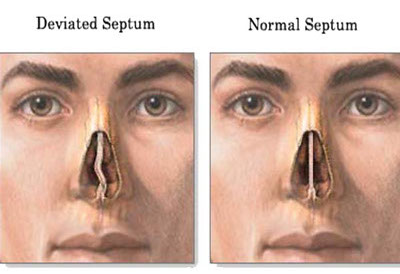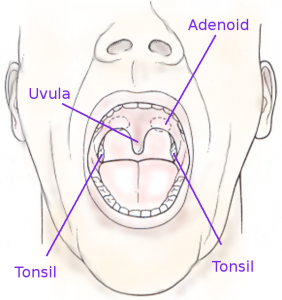Upper Airway Resistance Syndrome (UARS) | Everything you need to know
What is UARS - Upper Airway Resistance Syndrome? What are the symptoms, how is it diagnosed and treated?
~18 minute read
posted on September 20, 2019
Table of Contents
What exactly is UARS?
Upper airway resistance syndrome, or UARS, is a sleep-breathing disorder similar to obstructive sleep apnea.
While similar, there a few distinct differences between these two pesky conditions that are important when it comes to diagnosis, treatment, and symptoms.
UARS In a Nutshell
If you don't know what UARS is, here's my simple explanation for how I understand UARS.
As you could probably guess from the name, upper airway resistance syndrome occurs when there is narrowing in the airways that greatly increases the effort required to take a breath. Breathing with UARS could be compared to breathing through a straw... no fun at all.
During the night
It gets harder to breathe, and your body starts working overtime to make sure it's able to maintain your oxygen levels. This places a lot of strain on your heart, muscles, and brain.
As you could imagine, this increase in resistance also causes awakenings throughout the night, making it nearly impossible to get high-quality, undisturbed sleep. You might even be experiencing something known as a micro-awakening, which is when you wake up for maybe a few seconds (sometimes less than a second) and fall back asleep, never even remembering this happening.
In the morning
Waking up the morning after a night of UARS ridden sleep is sure to leave anybody feeling awful...
You might notice your jaw is sore after hours of clenching your jaw, mouth is drier than the Sahara Desert from the mouth breathing, and head is throbbing like someone blasted music in your ears all night.
Sounds like fun, right? Didn’t think so.
What are the symptoms of UARS?
What makes UARS so troubling is the subtlety of its symptoms... which often coincide with other illnesses such as depression, fibromyalgia, or autoimmune disease, making it difficult for one to find the true cause of their symptoms.
As the symptoms masquerade as other illnesses you'll be running doctor-to-doctor for blood test after blood test only to find little to nothing of value.
Even worse, from the perspective of someone with UARS, they are getting 8 hours of continuous sleep per night, unbeknownst to the hundreds of micro-awakenings they experience each night. They rarely question their sleep.
1. Excessive daytime sleepiness
The hallmark symptom of UARS is excessive daytime sleepiness with no apparent cause.
If you can sleep for 9 hours and wake up feeling just as tired — if not more, you might be suffering from some type of sleep disorder.
I personally have been able to sleep for 8-9 hours... open my eyes to glance at my phone, and before I know it, another 6-7 hours have passed. I finally drag myself out of bed but still can't seem to shake that groggy, sluggish feeling.
Are you tired of being tired?

Has your doctor run blood tests just to conclude that there's nothing abnormal? Maybe they were able to find one deficiency and treat it, but your fatigue is unrelenting.
If so, it could be possible that you suffer from a sleep breathing disorder such as UARS or sleep apnea.
2. Frequent awakenings at night
Do you wake up often during the night? It can be for any reason, either to use the restroom, just to roll over in bed, and anything else.
If you answered yes, your frequent awakenings could be caused by your UARS.
Often, people with UARS report that they have to wake up multiple times per night just to use the restroom. To the unsuspecting UARS sufferer, this could just be brushed off as having a small bladder.
3. Snoring
Snoring is the sound that occurs as air flows past the relaxed tissues in your airways. It seems like everybody knows somebody that snores, so how are you supposed to know when snoring is a sign of something more sinister like UARS?
Unlike obstructive sleep apnea where snoring is a hallmark symptom, those with UARS sometimes report mild snoring or no snoring at all!

Regardless of the severity, any snoring present at all would place you somewhere on the sleep breathing disorder continuum. Simply put, if you snore, you have a higher chance of suffering from a sleep-breathing disorder.
It's important to note, not everybody that snores has UARS, nor does everybody with UARS snore. When snoring is seen alongside multiple other symptoms, rather than snoring alone, then one might suspect UARS.
4. Cognitive impairment
It's interesting to see the various ways sleep deprivation will wreak havoc on your body.
One common manifestation of UARS is through cognitive symptoms such as...
- Brain fog
- Forgetfulness or memory deficits
- Anxiety and depression
- ADHD symptoms
Many UARS patients will report being treated by a psychiatrist for mental disorders such as anxiety, depression, and ADHD only to find out years down the line that treating their underlying sleep disorder alleviated all/most mental symptoms.
5. Unrefreshing sleep
Beep. Beep. Beep.
It's Monday morning, and nobody else but your alarm clock is there to jolt you awake.
Do you sit up, stretch, take a deep breath, and continue to take on the day?
Or do you wake up feeling like you were hit by a truck, with a dry mouth, headache, and swear you feel more tired than you did before going to bed last night?
Don't kid yourself. It's not normal to be tired.
Those suffering from sleep disorders like UARS often become accustomed to living their lives sleep deprived. They really don't know any better until treatment.
6. TMJ Issues & Clenching of Teeth During Sleep (Bruxism)
Do you ever wake up with a sore jaw or painful teeth?
Before you make an appointment with your dentist for a filling, you might want to look into visiting a sleep dentist to assess your symptoms and/or refer you to a sleep study.
7. Headaches when Waking Up
For those with UARS, morning headaches are just part of the usual routine.
Headaches caused by UARS are generally the most severe right when you wake up and diminish over the next 2-3 hours.
This is generally due to grinding of the teeth as the body is stressed during reduced flow episodes.
8. Dry Mouth
Ideally when we sleep, we should be breathing through our nose. Our nasal passages are a crucial component of the respiratory system and work to warm, moisten, and produce nitric oxide to clean the air you breathe and improve lung function.
When UARS causes reduced airflow during sleep, our mouths naturally open to help us get the air we need. While this is great for your lungs, you're likely to wake up with a dry mouth and cracked lips.
The real problem with mouth breathing is that it leads to a whole bunch of health problems when left untreated for years. Not to mention, it's a pretty tell-tale sign that you've got something going on with your breathing at night.
9. Nasal Congestion
Do you ever notice your nose completely stuffing up the second you lay down in bed?
If so, you might have allergies like me! I personally suffer from dust allergies and had to get a hypoallergenic pillow and mattress cover to alleviate this problem. I also have to religiously dust and clean my room and run an air purifier 24/7.
10. Hypotension (low blood pressure)
Unlike with obstructive sleep apnea which causes high blood pressure, UARS often causes low blood pressure.
The UARS diagnosis process
1. You suspect a sleep disorder
The first step in getting diagnosed with UARS is suspecting you have a sleep-breathing disorder like obstructive sleep apnea or UARS in the first place!
Since you're reading this, I'll assume you're looking for a solution to your excessive daytime sleepiness, cognitive issues, insomnia, and a whole bunch of nasty symptoms caused by UARS.
2. Make an appointment with your general practitioner (GP)
What to mention to your doctor
Be sure to mention all your symptoms you've been experiencing. I recommend writing them down on a piece of paper or on your phone before going just so you don't forget something important.
Seeing a specialist
It's not required to see a sleep specialist to undergo a sleep study and get a CPAP, however, your doctor is likely to refer you to a sleep specialist after a confirmed diagnosis.
3. Undergo a sleep study
A sleep study, or polysomnography (PSG) test, is necessary to diagnose UARS. It's also important to have a baseline to see improvements after treatment.
What should I expect from my sleep study?
At-Home Study
Sleep Lab Study
4. Wait patiently for the results
It usually takes between 1-2 weeks to recieve the results from your sleep study.
5. Discuss treatment with doctor
6. Start treatment
7. Modify treatment and monitor progress
How is UARS treated?
When it comes to treating UARS, all therapies tend to focus on a sole problem: keep the airways from narrowing or collapsing.
For the most part, UARS is able to be treated through the same methods in which obstructive sleep apnea (OSA) is treated, however, there are some gotchas to be noted.
The gold-standard for treating UARS without a doubt is a CPAP machine. Another popular option is a mouth piece made by your dentist that keeps your airway open.
There are also unconventional treatments that people have had varying levels of success with. Examples are playing the didgeridoo, changing your sleeping position, losing weight, and diet changes.
CPAP - Continuous Positive Airway Pressure
For treating UARS and other sleep breathing disorders such as obstructive sleep apnea, doctors typically prescribe a continuous positive airway pressure (CPAP) machine to keep your airways from collapsing at night.
A what machine?
A CPAP machine works by delivering a constant stream of air pressure through a hose and facial mask or nosepiece.
These machines must be calibrated by a sleep technician to dial-in the correct pressure. Once set at the optimal pressure, the CPAP machine should keep your airways open wide during times the airways become too narrow or collapse.
CPAP FAQ
How long do I need to use CPAP for?
You need to use the CPAP every night to notice its benefits.
How do I get a CPAP machine?
You must be prescribed a CPAP machine by your doctor.
You'll also need to complete some form of a sleep study confirming a UARS diagnosis, in-lab or at-home, before being prescribed a CPAP.
Once you get your prescription, you can purchase a CPAP through a local durable medical equipment (DME) supplier or a more cost-effective option is purchasing online through a site like CPAP.com. Shopping online is definitely the way to go in my experience as most DMEs overcharge for the same products.
Behavioral and Lifestyle Changes
1. Lose some weight
Not only can losing a few extra pounds help you look and feel your best, it'll also help you sleep better!
2. Change your sleeping position
Did you know that sleep breathing disorders such as UARS and OSA are usually worse when one is laying on their back?
While it may not be a cure all, changing your sleeping position from your back to your side/stomach can possibly alleviate some of your symptoms. When combined with a nasal decongestant such as oxymetazoline, studies have shown slight improvements in UARS symptoms.
3. Learn to playing the didgeridoo
The didgeridoo is an Australian wind instrument that has been around for over 1,500 years.
Believe it or not, learning to play this ancient instrument has been shown to improve UARS symptoms.
Behavioral Changes FAQ
Oral Appliances
For those with mild UARS or unable to tolerate CPAP therapy, an oral appliance custom-made by an orthodontist or dentist is typically the next best option.
The oral appliances are a lot more convenient to use... no need to lug around a bulky CPAP machine when traveling -- just throw the mouthpiece into your backpack and you're good to go!
Types of Oral Appliances
- Mandibular Advancement Device (MAD)
- Tongue retaining device
Surgery
When it comes to UARS, surgery is typically last-in-line as far as treatment options go.
Depending on the pathology of your UARS, your doctor might suggest a specific surgery for your situation
- Turbinate reduction
- Septoplasty
- Uvulopalatopharyngoplasty (UPPP)
- Genioglossus bone advancement
Surgery FAQ
Nasal Steroids and Antihistamines
In some cases of UARS that are caused by inflammation due to allergies, one might be able to find relief using nasal steroids or antihistamines.
So what causes UARS in the first place?
While there are a handful of causes of UARS, they all share one similarity: excessive resistance in your airways. This is sure to cause sleep fragmentation and other UARS symptoms.
This resistance can almost be like breathing through a straw while you're asleep. No matter how much effort you put in to breathe, sometimes you just can't get enough air.
The tricky part about treating UARS is finding out what exactly is causing it in the first place!
Thankfully you should be able to treat your UARS with a CPAP machine or oral appliance regardless the exact cause. All treatments of UARS have one goal in mind: improve airflow to reduce respiratory distress.
6 Most Common Causes of UARS
There are so many causes of UARS, finding out what's causing yours can be like finding a needle in a haystack.
Some peoples' airway resistance may stem from a deviated septum, while others may have poor craniofacial development which causes the lower jaw to be recessed.
1. Nasal Congestion
Do you often find yourself laying down at night and suddenly your nose is all kinds of stuffed up?
If you are struggling to breathe through your nose for whatever reason such as allergies, illness, or a deviated septum, it is bound to have a negative impact on your sleep.
When you can't breathe through your nose during sleep, we naturally begin to breathe through our mouths. Unfortunately, mouth breathing is far from ideal and can cause dry mouth in the morning, snoring, and unrefreshing sleep.
I personally am allergic to dust, and had to invest in hypoallergenic pillow and mattress covers to stop myself from being completely stuffed up right after laying down.
I've also heard many great things about allergy shots to help improve sleep quality in those with nasal congestion issues.
2. Obesity or Overweight
Obesity is defined by a body mass index (BMI) greater than 30. An overweight BMI is 25-30.
You can use a BMI calculator to find yours.
Being overweight is one of the most common causes for obstructive sleep apnea, and UARS is no different.
Even if you are only slightly overweight, every pound you lose is sure to benefit your sleep quality.
3. Deviated Septum
A deviated septum is a condition in which the bone and cartilage that divide the nasal cavity into two is crooked or off-center which can cause difficulty breathing through the nose.

You may have a deviated septum and not even know it... if you've ever endured a pretty nasty injury to the nose when you were younger, there's a chance you do.
Symptoms of a deviated septum are: obstruction of one or both nostrils, nosebleeds, facial pain, noisy breathing, awareness of nasal cycle, and only being able to sleep on a particular side.
If your doctor determines a deviated septum to be the cause of your UARS, it's pretty safe to say that the reconstructive surgery will greatly improve your sleep and change your life.
4. Narrow Nasal Passageways
Unfortunately, some people are just born with narrower-than-usual nasal passageways.
In this case, you may want to ask your doctor about surgical options such as turbinate reductions.
5. Small, Crowded Jaws
6. Enlarged adenoids or tonsils
Your adenoids are a small patch of tissue found high up in the throat, just behind your nose. Together with your tonsils, they make up your body's lymphatic system.

Enlarged adenoids and/or tonsils is one of the most common causes of UARS, and those with this issue can often undergo removal surgery, tonsillectomy or adenoidectomy, with good success.